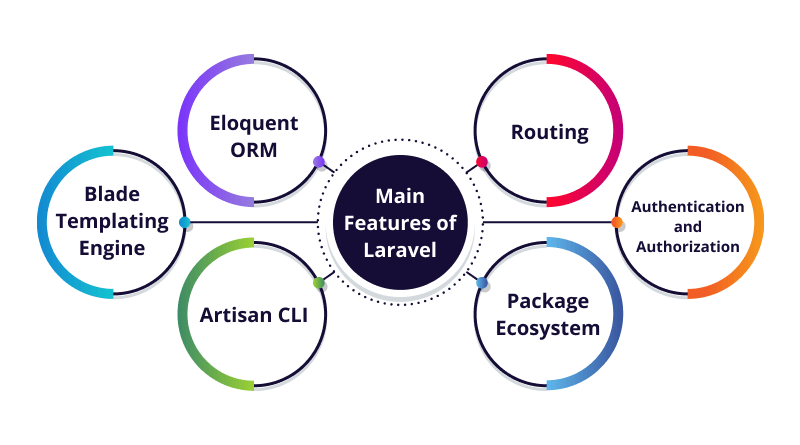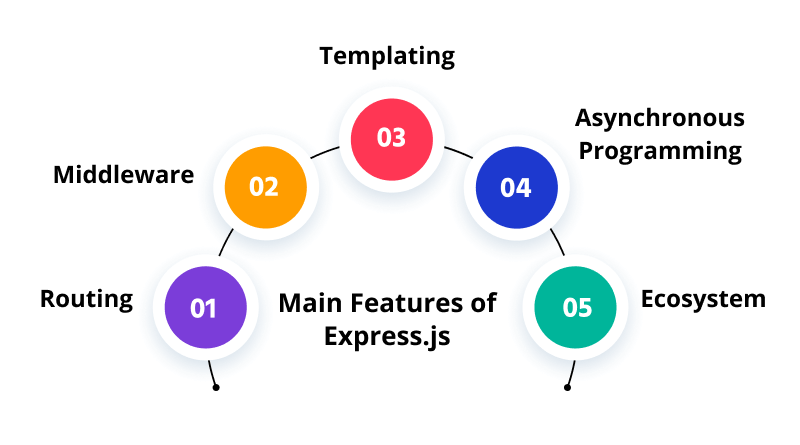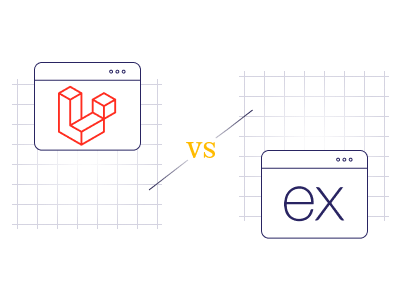Are you thinking about the success of the web application? Or perhaps you are still confused between Laravel vs. Express Choice for web development. Web development programming languages are the current trend in the success of any web application development. Whether you choose a well-defined web hosting service or top-notch tools, your efficiency with the programming languages can define all the good for you.
A recent survey conducted by Stack Overflow places Express at the very top as the most loved framework, and Laravel among the top 5 most used frameworks. The popularity of these frameworks has surfaced in their effectiveness and versatility in building web applications. Further, the study also states that the highest recorded usage of Node.js was 51% in 2020, ultimately leading to the need for the best Node.js hosting services. Hence, we can conclude that Express has outranked other programming languages effortlessly.
The backend choice for web development between Laravel vs. Express may have a great influence on the project’s efficiency, scalability, and maintainability. Therefore, in this blog post, we’re going to go in-depth comparing some of the most important features of Express.js vs. Laravel performance, outline its strengths and weaknesses, and make it easier to make an informed decision regarding your next planned project.
Before we move ahead, you can also check out our detailed blog: CodeIgniter vs. Laravel, an insightful study about the best frameworks for your projects. It will help you make a clearer choice between Express.js and Laravel.
Table of Content
Understanding Laravel
Let’s start with understanding what a Laravel framework is. Laravel is a high-level PHP, open-source framework that uses an elegant syntax, expressive API, and robust ecosystem. It supports a rich set of tools as well as a remarkable number of features for smooth development and quality code. Further, with redundant and best managed Laravel hosting solutions, developers can easily take their web applications with seamless deployments.
Top Perks:
- It is one of the best PHP frameworks and hence uses PHP as its programming language.
- It is a full-stack framework consisting of inbuilt features like ORM, templating, authentication, and so much more.
- Ideal for medium and large applications.
Main Features of Laravel

- Eloquent ORM: A high-level object-relational mapper with simplified interactions with the database and associated clean models and relationships.
- Blade Templating Engine: A simple templating system to generate clean, readable, and maintainable views.
- Artisan CLI: The command-line interface is designed to automate repetitive tasks like generating code, running migrations, and so on.
- Routing: A flexible routing system allows you to define routes for various HTTP methods as well as URL patterns.
- Authentication and Authorization: Built-in features for user authentication and authorization ease the process of securing your application. Furthermore, it gives Laravel an upper hand when Express vs. Laravel performance is compared.
- Package Ecosystem: A massive package ecosystem available in Composer that provides ready-to-use solutions on common tasks, like caching and testing and sending payment or email.
Laravel Advantages
- User-friendly for developers: The intuitive syntax and full documentation will enable developers to learn and use the package easily and quickly.
- Productivity: Built-in features and tools could profoundly increase development speed and efficiency.
- Scalability: Laravel is optimized for heavy traffic and easy to scale for growing user bases.
- Community and Support: Has a huge, active community giving excellent support, many resources, and third-party packages.
Laravel Disadvantages
- Performance: Although Laravel is a performance application, at times it may be more sluggish as compared to lightweight frameworks, such as Express. This in return offers a competitive analysis of Express.js vs. Laravel.
- Learning Curve: For developers with little to no experience in PHP or with object-oriented programming, the learning curve is higher as opposed to easier frameworks such as Express.js.
Understanding Express.js
When we look into the Express.js vs. Laravel difference, the major factor comes in the syntax. Express.js is one of the minimalist and flexible Node.js web application frameworks that gives a solid foundation for building robust and scalable web applications.
Top Perks:
- It is one of the best JavaScript frameworks (Node.js) and hence works using JavaScript or Node.js as its programming language.
- It is a minimalist framework that offers a base to set up web applications.
- Perfect for smaller, flexible applications and APIs.
Main Features of Express.js

- Routing: Among Express vs. Laravel performance, Express offers a flexible routing system, which allows you to define routes for the different HTTP methods and URL patterns.
- Middleware: With Express, you get a middleware, i.e., a mechanism that lets you handle requests and responses, enabling you to do all kinds of tasks, including authenticating requests and logging the results, handling errors, and many more.
- Templating: Express does not have a built-in templating engine; however, it works very well with popular ones like EJS, Pug, and Handlebars.
- Asynchronous Programming: The non-blocking, event-driven architecture of Node.js makes Express.js highly suitable for handling concurrent requests.
- Ecosystem: There are numerous modules to use within the ecosystem via npm, from database interactions and authentications down to testing and deployment.
Express.js Advantages
- Performance: Express.js is a very fast and scalable application for performance-intensive applications.
- Flexibility: The minimalist framework design provides developers with maximum flexibility when defining the application architecture.
- Learning Curve: As far as learning is concerned, it is relatively easy to learn for those who are well aware of JavaScript and Node.js.
- Community and Support: Express.js possesses an enormous, dynamic community that provides immense support, resources, and third-party modules.
Express.js Disadvantages
- Boilerplate Code: Laravel vs. Express.js is code-based. Although Express.js is minimalist, it still uses more boilerplate code than a full-stack framework like Laravel.
- Structure: There is nothing to prevent you from creating loosely structured code, which will make it difficult to control any large and complex applications without the right structuring.
Laravel vs. Express.js Comparison Table
| Feature | Laravel | Express.js |
| Programming Language | PHP | JavaScript |
| Framework Type | Full-stack | Minimalist |
| Philosophy | Convention over Configuration | Don’t Repeat Yourself (DRY) |
| Database Abstraction | Eloquent ORM | No built-in ORM, but integrates well with popular ORMs like Sequelize |
| Templating | Blade Templating Engine | No built-in templating, but integrates well with popular engines like EJS, Pug, and Handlebars |
| Authentication and Authorization | Built-in features | No built-in features, but integrates well with libraries like Passport or Passport-Local |
| Ecosystem | Composer for package management | npm for package management |
| Performance | Generally good, but can be slower than Express.js in certain scenarios | Known for high performance |
| Learning Curve | Steeper for developers new to PHP or object-oriented programming | Easier for developers familiar with JavaScript and Node.js |
| Scalability | Designed for scalability | Scalable with proper architecture and optimization |
| Use Cases | Enterprise applications, complex web applications, e-commerce platforms | Real-time applications, APIs, microservices |
Laravel vs. Express.js: Which One to Choose?
Choosing between Laravel and Express.js depends on many factors, such as:
- Project Requirements: Depending on the specific needs of your project, whether it is complex, has scalability requirements, or has some specific features that you want to incorporate into it.
- Team Expertise: Decide if your development team is proficient in either PHP and thus Laravel or rather skilled in JavaScript and Node.js on the one hand, making Express.js fit them well.
- Development Philosophy: Determine if you want a full-stack framework with deep instant capabilities or a minimalist with the most freedom.
- Long-term Goals: Consider how your application might be scaled into a possibly much larger version later. Again, both Express.js vs. Laravel frameworks are capable of handling large-scale applications and will scale and maintain well; however, they might have different approaches to scalability and maintainability.
Still analyzing Express.js vs. Laravel performance? Both Laravel and Express.js are excellent backend framework web development choices. The fierce competition among Laravel and Express.js is because of the long list of their strengths and weaknesses. When the question comes to the decision, among them a lot of factors matter. If you need a full-stack framework with numerous features and a good community following it, Laravel is your best bet. Its popularity is because of the demanding features such as Eloquent ORM, Blade templating engines, and Artisan CLI, all of which help to ease the load of development and yield productivity.
If, however, you’re interested in a minimalist strategy that provides greater flexibility and control, the Express.js development framework is just perfect for you. Its modular architectural pattern and integrative capacity allow you to mold the framework as best suited to your needs.
The best thing you can do to determine which framework fits you is to experiment with it and consider the needs of your project and the preferences of your team. Test your web design trends and development progress using both and analyze them based on performance, scalability, maintainability, the availability of third-party libraries, and support. This is the best way to align with your goal and obtain a dedicated web hosting experience for your applications.
FAQs
How are Laravel and Express.js different?
Laravel vs. Express are different from each other even though both are used in web development. Laravel is a full-stack PHP-based framework that includes everything you would need to run your web application.
Express.js is a minimalist framework for the Node.js environment that implies flexibility and control over the architecture of the application. Laravel is well-suited for bigger projects with various complexity, whereas for smaller, more agile applications, Express suits better.
How does Laravel compare to Express.js in terms of performance?
About the comparison of Express.js vs. Laravel performance: Express.js is slightly preferable in terms of performance because it uses Node.js for the engine and asynchronous programming.
However, the two frameworks can still be optimized with proper configuration and coding practices. When users apply these frameworks in their real-world scenarios, the performance difference between Laravel vs. Express.js is negligible.
Which is easier to learn: Laravel or Express.js?
The ease of learning depends on the familiarity with the programming languages. The learning curve is a breeze if you are familiar with and know related development concepts.
If you know PHP pretty well, Laravel may be easier to learn since it is more structured. Likewise, if you know JavaScript and Node.js, Express.js will be a more natural extension for your learning course.
Which has a larger community and support network: Laravel or Express.js?
Both use technologies to operate with massive active communities, providing very rich support, resources, and third-party packages. Although with detailed insights, users find Laravel has a larger community, popularity, and scope of applications of the framework than Express.js.








